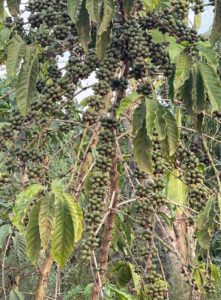Today was a day off so not much to report from a medical perspective. I instead enjoyed the day doing my laundry (by hand!), studying, reading, and baking banana bread. I had to make sure I bought the right types of bananas as there are five different types here and only one is tasty enough to eat fresh. The types are cooking bananas (for making matoke- consistency of mashed potatoes), brewing bananas (for making juice and fermented brew called ntoto), dessert bananas (which you eat fresh and are super sweet), roasting bananas, and the exotic red banana. I chose a dessert banana variety called sukali ndizi (aka apple banana). Bananas are quite ubiquitous in this area so they are not hard to find. I have seen several bicycle riders balancing up to 10 bunches of bananas (with about 50 bananas each) on their handlebars to take to the market. While the banana is grown everywhere, the true “cash crop” of Uganda is cocoa and coffee beans. These trees also grow everywhere, both wild and cultivated, and they need very little water so grow well during the dryer seasons here. Their harvest period is in December and many Ugandans rely on the money generated from their crop each year to live on for the rest of the year. One kilogram of beans typically sells for about 4,000 Uganda shillings (about $1.30) and there are about 70 kilograms in a full market bag. One acre of land can produce 1-2 bags so, if you have several acres, a family can generate quite substantial revenue. Other plants I have noticed growing naturally here are sweet potatoes, papaya, pineapple, mango, tomatoes, passion fruit, avocados, and jackfruit. These are staples of the diet here in addition to beans, rice, meats (free range based off the amount of goats, chickens, and cows roaming the streets), eggs, and cows milk. Everything is always sold ready to eat or use that day or the next. People do not shop for several days in advance so if something is not yet ripe, it will not be available to be sold. If you want an avocado for 2-3 days from now you sometimes can ask to buy it “for tomorrow” but mostly the farmers will not sell it as they want to make sure it is good to sell first. Our lunches at the guest house are made for us each day and they typically consist of vegetable casseroles, beef stews, “pizza” with fresh made dough and any vegetable in the fridge, coleslaw, and lots of fresh fruit and avocado on the side. Overall, I have liked all the food thus far and my digestive system is thankful of all the fresh food (as am I!). Anyway, the banana bread turned out well enough once I figured out how to light the stove, and just like that I am looking back at another wonderful day in Kiwoko.
Lugandan word of the day: nakupenda (“knock-oo-pen-dah”, I love you)
Medical learning point of the day: Cutaneous myiasis is a skin infection by the larva of certain types of flies. When hanging your laundry outdoors to dry in Uganda, you must iron it before wearing or be subject to becoming an accidental host of the mango fly larva and developing this skin condition. The flies will lay eggs in the fibers of clothing and ironing kills the eggs so they do not hatch into their larval form.




